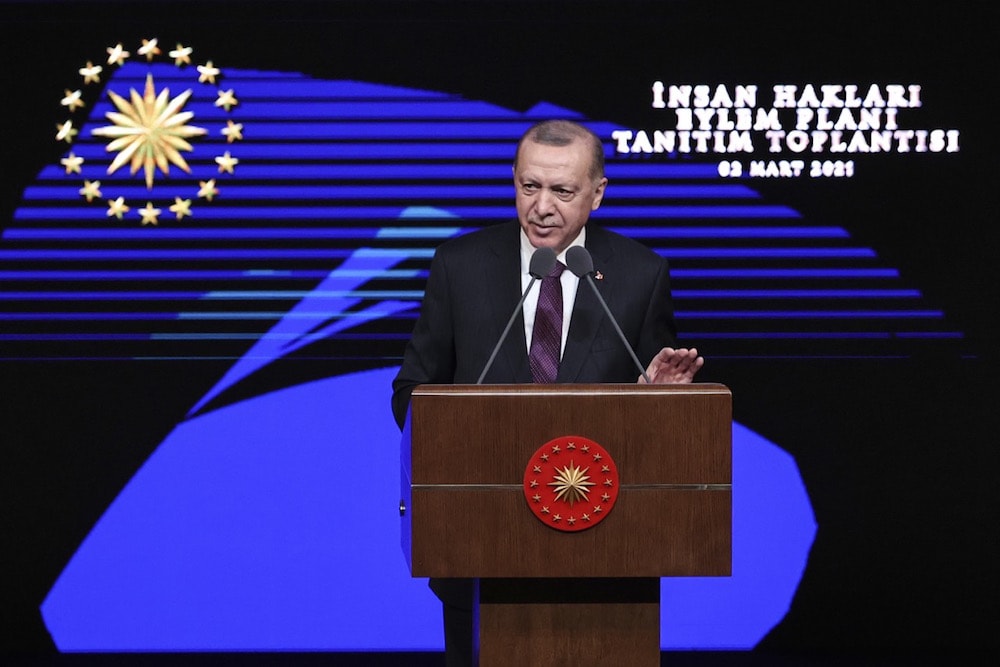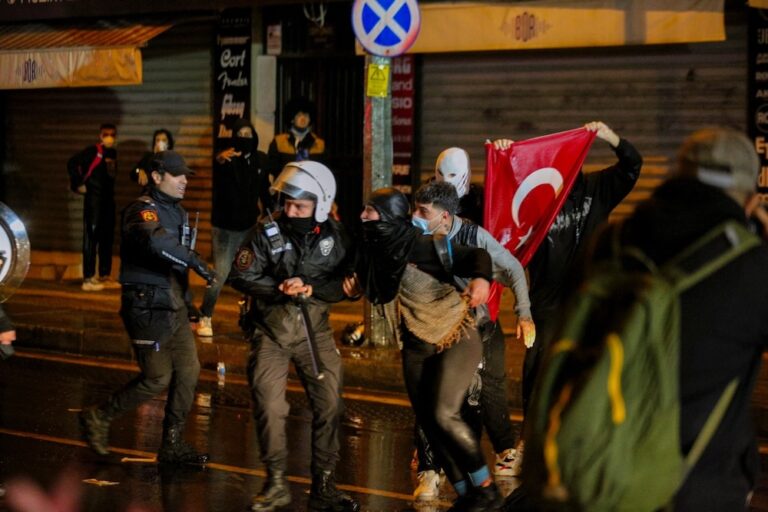"The lack of a clear implementation schedule, the exclusion of NGOs in the mechanism for protection of human rights and failure to word the measures to be taken in concrete language raise doubts about the implementation of the plan".
This statement was originally published on expressioninterrupted.com on 11 March 2021.
The lack of a clear implementation schedule, the exclusion of NGOs in the mechanism for protection of human rights and failure to word the measures to be taken in concrete language raise doubts about the implementation of the plan
CANAN COŞKUN
The “Human Rights Action Plan” announced by President Recep Tayyip Erdoğan on 2 March 2021 is at the center of criticism by human rights defenders, legal experts and politicians.
Drafted by the Ministry of Justice, the action plan involves a total of 11 main principles, 9 aims, 50 goals and 393 activities to be implemented over a two-year period, promising a number of legal reforms. The ultimate aim of the action plan is stated as laying the groundwork for “a civilian constitution.” However, the ambiguity of the scope of some of the measures announced by President Erdoğan, with particular regard to strengthening freedom of expression and press freedom, cast doubt on the implementation of the plan.
The overarching aims – listed under the headings of judicial independence and the right to a fair trial; protection and promotion of freedom of expression, association and religion; strengthening personal liberty and security; a more effective protection of the rights to property; and protection of vulnerable groups – are widely slammed on the grounds that they are ambiguous and abstract, and not solution-oriented; critics define the proposed plan as “putting makeup on a bedridden patient.”
The lack of a clear timetable for the implementation of the action plan and the exclusion of non-governmental organizations (NGO) in the mechanism for the protection of human rights are also among the contested issues.
Expression Interrupted asked legal experts, politicians and human rights advocates to evaluate the action plan in terms of its possible effects on free speech and the civil society.
Action plan is a confession that the system has failed
Emma Sinclair-Webb, Turkey Director for Human Rights Watch (HRW), stresses that there is an abundance of overgeneralizations, technical details and ambiguous expressions in the action plan: “Such technical arrangements should not be included in the text in the first place. Most people may not understand what they mean. With respect to the right to liberty and security and also catalogue crimes, it is said that ‘The requirement to rely on concrete evidence will also be rendered applicable’ for detention. This should not count as a reform. In a sense, they implicitly admit that there have been detentions without concrete evidence. Instead, the existing pre-trial detention decisions should have been reviewed or the people in question should have been released. This means thousands of people have been wronged because of arbitrary pre-trial detentions.”
There are also doubts as to how the regulations will be implemented. Stating that the action plan acts as a confession of the problems with the current practices, Sinclair-Webb says: “With the new regulation, it is hinted that there will be no more dawn raids. Will this message come across to the police and the Interior Ministry as well? The action plan introduces a vertical objection procedure against the orders of criminal judgeships of peace. In fact, they are pretty much saying that the system has failed in a roundabout way.”
Noting that she participated in one of the workshops held during the preparation of the action plan, Sinclair-Webb says that she witnessed some senior judges who were also in attendance complaining about the criminal judgeship system: “They were saying that it wreaked havoc on the judicial system. There were no systematic consultation processes in these workshops. We have issued numerous reports on human rights, where we give concrete recommendations; [the government] could have made more use of them.”
Pointing out that the lack of an implementation schedule for the action plan is also a significant shortcoming, Sinclair-Webb says: “It is not clear when and how the plan will be implemented. It will be very difficult to implement the aims, since the guidelines are not covered in the plan. Just this week they tried to destroy the HDP [Peoples’ Democratic Party] with various moves, last week they penalized human rights defenders. The previous week, they detained Boğaziçi University students. It’s schizophrenic.”
Sinclair-Webb also underlines the timing of the announcement of the plan: “On 9 March, the Committee of Ministers of the Council of Europe will meet. There will be discussions regarding the execution of the ECtHR judgments in the cases of Osman Kavala and Selahattin Demirtaş. I think the announcement of the plan is about saving time and trying to look cute to Europe.”
What the action plan leaves unsaid
Kerem Altıparmak, an academic and lawyer who specializes in human rights law, emphasizes that when looking at what is included in the action plan, it is also necessary to look at “what is not.” To that end, Altıparmak says: “First, it appears that this action plan is in fact an output of a European Union project and related to the implementation of the judgments of the ECtHR. When we look at what is not included in the plan, we can confidently say that one of the main human rights problems in Turkey right now is arbitrary detentions. I say this based on the recent ECtHR judgments regarding Osman Kavala, Selahattin Demirtaş, Murat Sabuncu, Ahmet Şık and Atilla Taş, but also on the cases before the court pending review. There is nothing new in the regulation about arbitrary pre-trial detentions. Narrowing down the scope of catalogue crimes in detention doesn’t solve any problems. Remember, the previous measure to limit the maximum period of pre-trial detention to two years hadn’t solved any problems either. It is not clear how the action plan will address this problem. Besides, the government says there is not a single problem with the issue of pre-trial detention in its action plan concerning the case of Osman Kavala [submitted to the ECtHR as a respondent State]. So, this is also not covered in the action plan.”
Altıparmak also stresses as a second point that the action plan lacks an article with respect to the eventual permanency of the statutory decrees issued during the state of emergency (OHAL), initially declared for a period of three months in the wake of the 15 July failed coup attempt and lasted for over two years: “There is nothing about dismissals, there is nothing about the associations that were shut down. It is an egregious and protracted violation. The plan says that the restrictions on access to a lawyer will be partially lifted but says nothing concrete on how this will be done. Just check out the section about freedom of expression and the right to peaceful assembly. It says some open-ended things like the relevant legislation and practice will be ‘reviewed.’ In Hakkâri, all public meetings have been banned for 245 days straight. The action plan promises nothing to eliminate the grave effects and consequences of the state of emergency.”
Altıparmak adds: “Thirdly, there is nothing in the action plan to ease the mounting pressure on politicians, journalists, and civil society. If you look at it in terms of politicians, there is nothing in there about, say, government-appointed trustees or lifting parliamentary immunity. They have just amended the law on associations, creating considerable troubles for human rights advocates. There is no regulation regarding this. There is nothing concrete about journalists, either.
“There is nothing in the regulation about arbitrary pre-trial detentions, the continuation of the state of emergency, freedom of expression and association. What’s more, there is no issue about the structure of the Council of Judges and Prosecutors [HSK], or dismissal of judges and prosecutors, considering the state of law, underlying all these. One critical issue that is mentioned, however, concerns the right to appeal the decisions of criminal judgeships of peace and the other is about the prevention of transfer of judges without their consent. To my mind, these regulations mean that there is no longer any need for criminal judgeships of peace. When criminal judgeships were established, the Venice Commission said that the system posed a serious problem in terms of the independence and impartiality of the judges, to which the government – in their opinion – responded saying there was simply no such problem. Now, that was the government’s position until two days ago. Since the action plan envisages the introduction of a vertical objection procedure, it means they see no risk whatsoever that the decisions of the criminal judgeships will be overturned. I think that’s very telling. It’s certainly not something to be happy about, because it is an indication of how confident the government feels about the judiciary.”
“Human Rights Committee draws the curtain over rights violations”
Ömer Faruk Gergerlioğlu, a lawmaker from the pro-Kurdish opposition HDP and a member of the Parliament’s Human Rights Inquiry Committee, assesses the proposed plan in terms of the measures for the prevention of rights violations. Noting that the violations have only increased after the announcement of each reform package or action plan in the past, Gergerlioğlu expresses his concern that the situation will get worse:
“‘There is no systematic torture’ and ‘Zero tolerance to torture’ are the stock phrases of the AKP (Justice and Development Party). I am a member of the Human Rights Inquiry Committee. I have repeatedly asked the ministry about the petitions on torture and the allegations of strip searches in prisons, they were not investigated. I took them to the Human Rights Inquiry Committee, again, they were not investigated. Now they are saying that they will offer regular trainings to prison staff on this issue, but when you ask, they say, ‘There is no ill-treatment.’ Actions speak louder than words! They should offer these human rights trainings to AKP and MHP (far right Nationalist Movement Party) deputies. The Human Rights Inquiry Committee has turned into Human Rights Violation Committee. All they do is drawing the curtain over each and every violation.”
Noting that he has submitted more than 2,000 parliamentary questions to be answered by the Justice Ministry, Gergerlioğlu says that not a single decision that acknowledges the existence of torture in prisons has been issued so far in response to his motions: “For instance, about two or three months ago, Gökhan Gündüz was beaten in Kırıkkale Prison and his arm was broken. The prosecution dismissed the investigation against the suspects. Later, the Constitutional Court ruled that his rights had been violated. When these things were happening, they were turning a blind eye to them. When I asked if there were any investigations about the officials in the Kırıkkale Prison last week in the Human Rights Inquiry Committee, it was very clear to me that they had no intention of doing anything about it.”
Recalling the investigations launched against him for bringing up strip search complaints and other similar violations in prisons, upon which he was accused of being “a terrorist” or a “FETÖ partisan,” Gergerlioğlu says that he currently faces the risk of having his parliamentary immunity revoked upon the recent Supreme Court of Appeals judgment upholding a 2.5-year prison sentence he was given in 2018.
Gergerlioğlu says: “Someone violates rights, and the compensation shall be paid out of the state’s pocket, that is, out of all of our pockets. That’s the current situation. They are going to come up with a human rights action plan with fancy words, pompous words, and supposedly look all cute to Europe. Which action plan is this? There were promises of freedom of expression in the previous one as well. But violations increased even more. They really shouldn’t mess with our heads. We can see the truth. With this action plan, nothing new will happen and everything will only get worse. Turkey needed some freshening up. Now, they are applying this makeup on a bedridden patient. Well, that makeup isn’t fooling anyone.”
“A liberal approach should prevail”
Human Rights Association (İHD) Co-Chair Öztürk Türkdoğan, on the other hand, asserts that raising awareness about human rights is dependent on the protection and enhancement of non-governmental organizations, whereas the Human Rights Action Plan assigns the task predominantly to government institutions.
Noting that the action plan is questionable in terms of its outlook on civil society at large, Türkdoğan states that the plan can hardly go beyond being a “good faith document” due to its contradictions and lack of solution-oriented concrete steps:
“Rather than the civil society, strengthening the public sphere in human rights underscores that the government’s outlook on the issue is still dominated by its security-driven stance. However, a more liberal outlook should have prevailed, and relevant recommendations to ensure the inclusion of NGOs in the mechanism for the protection of human rights should have been made.
“In order to fulfill the aims outlined in the action plan, Turkey has to solve its fundamental problems, in other words, initiate procedures for conflict resolution. For this to happen, the government has to demonstrate a new political will to move from a security-oriented approach to a liberal approach. For a country like Turkey that hasn’t undergone a conflict resolution, that hasn’t resolved the Kurdish issue, that hasn’t fulfilled the demands of the Alevi community for equal citizenship, that hasn’t put an end to the political tutelage régime, that hasn’t established a system based on gender equality, that hasn’t managed to secure freedom of expression, that hasn’t adopted a democratic and civilian constitution, it is extremely difficult to meet these commitments. As a consequence, countless contradictions emerge. As the Interior Minister was targeting the Human Rights Association, the Ministry of Justice invited us to a meeting to work on the action plan, which we accepted and shared our views. So, how will they resolve this contradiction? The state itself is in utter contradiction. The only solution to this is to take a stand for freedoms and the civil society. Unless such a will is shown, the action plan will hardly be anything more than a good faith document.”



